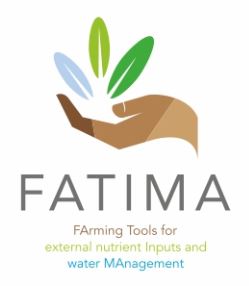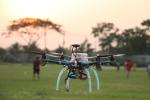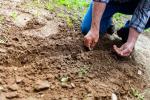
H2020 FATIMA Project: Agricultural tools for external nutrient inputs and water management
- Type Project
- Status Filled
- Execution 2015 -2018
- Assigned Budget 7.966.697,00 €
- Scope Europeo
- Main source of financing Horizon 2020
- Project website FATIMA
The multi-stakeholder community has been fundamental to FATIMA. It is with them and for them that the methodology, systems, services, tools, products, and frameworks have been developed and implemented throughout the project. A directory of the multi-stakeholder platform is available. User alliances and networks remain important after the project ends, as they constitute one of the fundamental pillars for the sustainable implementation of FATIMA services.
FATIMA's services, tools, and products are technically advanced, innovative, and well-positioned in a rapidly expanding market. Key services include crop monitoring, management zoning, variable rate (VR) fertilizer scheduling (pre-season and in-season), and irrigation scheduling (predicting crop water needs up to a week in advance).
A set of business cases has been developed that respond to the needs of local and regional users on the ground (e.g., farmers, farmers' associations, agricultural consultants, extension services).
Cost-Benefit Analysis (CBA) at the farm level is a complementary tool that helps farmers decide which technology to adopt or which service to acquire. It is available as a spreadsheet ("CBA calculator"). It has the dual function of assessing farm profitability on the one hand and the economic viability of a FATIMA service on the other.
FATIMA has produced a wide range of tools, from webGIS platforms to calculators (for nutrients, yield, irrigation, WEF, CBA); a complete EO methodology package; models; a high-resolution variable rate technology (VRT) scanner-spreader; several adapted VRT fertilizer spreaders; wireless sensor networks (WSNs); and even thematic frameworks.
During the three years of the project, FATIMA has generated comprehensive databases of biogeophysical and socioeconomic data.
In the long term, changes in agricultural practices (crop rotation, cover crops) and the transformation to more sustainable production systems (conservation agriculture, organic farming) are also indicated. At FATIMA, we have placed this within the framework of agroecology and developed a transition roadmap based on scenario assessment combined with multi-year fieldwork.
An important part of FATIMA's comprehensive strategy has been a comprehensive socioeconomic assessment using multicriteria analysis (MCA) and choice experiments (CE), as well as cost-benefit analysis (CBA) and water-energy-food analysis (WEF).
The political aspects of short- and long-term strategies have been analyzed and pilot cases have been documented, resulting in a set of policy recommendations.
FATIMA addresses the effective and efficient monitoring and management of agricultural resources to achieve optimal crop yield and quality in a sustainable environment. It covers both ends of the scale relevant to food production: precision agriculture and the perspective of sustainable agriculture in the context of integrated agri-environmental management. It has developed innovative and new agricultural capabilities that help the intensive agricultural sector optimize the management and use of its external inputs (nutrients, water), with the vision of connecting sustainable agricultural production with fair economic competitiveness.
Our comprehensive strategy encompasses five interconnected levels: a modular technology package (based on the integration of Earth observation and wireless sensor networks into a web GIS), a fieldwork package (exploring options for improved land and input management), a toolkit for multi-stakeholder participatory processes, an integrated multi-scale socio-economic analysis framework, and an overarching set of policy analyses based on an indicator approach.
FATIMA addresses and works with user communities (farmers, managers, and decision-makers in the agricultural and agro-industrial sectors) at scales ranging from the farm, irrigation system, and aquifer to the watershed. It provides them with maps of projected fertilizer and water requirements (to power precision agricultural machinery), crop water consumption, and a range of additional products for sustainable crop management, supported by innovative water and energy footprint reference frameworks. All information is integrated into state-of-the-art spatial, participatory, and online decision-support systems. FATIMA's innovative service concept considers economic, environmental, technical, social, and political dimensions in an integrated manner.
FATIMA has been implemented and demonstrated in seven pilot areas representative of key European intensive agricultural production systems: Spain, Italy, Greece, the Czech Republic, Austria, France, and Turkey.
FATIMA addresses the effective and efficient monitoring and management of agricultural resources to achieve optimal crop yield and quality in a sustainable environment. It covers both ends of the scale relevant to food production: precision agriculture and the perspective of sustainable agriculture in the context of integrated agri-environmental management. Its objective is to develop innovative and new agricultural capabilities that help the intensive agricultural sector optimize the management and use of its external inputs (nutrients, water), with the vision of connecting sustainable agricultural production with fair economic competitiveness.
Our comprehensive strategy encompasses five interconnected levels: a modular technology package (based on the integration of Earth observation and wireless sensor networks into a web GIS), a fieldwork package (exploring options for improved soil and input management), a toolkit for multi-stakeholder participatory processes, an integrated multi-scale economic analysis framework, and an overarching set of policy analyses based on an indicators, accounting, and ecological footprint approach.
FATIMA addresses and works with user communities (farmers, managers, and decision-makers in the agricultural and agro-industrial sectors) at scales ranging from the farm, irrigation system, and aquifer to the watershed. It will provide them with maps of fertilizer and water requirements (to power precision agricultural machinery), crop water consumption, and a range of additional products for sustainable crop management, supported by innovative water and energy footprint reference frameworks. All information will be integrated into state-of-the-art spatial, participatory, and online decision-support systems. FATIMA's innovative service concept considers economic, environmental, technical, social, and political dimensions in an integrated manner.
FATIMA will be implemented and demonstrated in eight pilot areas representing the main European intensive crop production systems: Spain, Italy, Greece, the Netherlands, the Czech Republic, Austria, France, and Turkey.
FATIMA introduces new technologies as tools and services to facilitate nutrient and irrigation water management on farms, providing information to a wide range of stakeholders with the spatiotemporal resolution they require, in a non-academic, non-technical, easy-to-use, and intuitive manner, thus encouraging participation.
FATIMA offers a synergy of complementary, innovative farm management solutions (based on new technologies, crop management practices, or cropping systems) and innovative policy frameworks, proven to help farmers increase nutrient and water use efficiency and improve soil quality, while increasing farm profitability and reducing environmental impact. Applied on a large scale (which will be based on our broad cross-section of demonstration cases in seven countries, covering major EU crops), they provide the tools and a roadmap for the intensive agricultural sector to reorient itself and achieve the necessary paradigm shift toward truly sustainable agriculture.
Direct collaboration with key users and relevant government organizations, including active stakeholder engagement and gender mainstreaming, increases the likelihood of successful implementation in policy and practice.
The information and knowledge generated by the project will be used, to some extent, for future research, but primarily for exploitation. The main exploitable output of the project is the Participatory Information, Decision Support and Expertise System for Irrigation and River Basin Water Management (SPIDER) and its Italian counterpart, Irrisat, as well as the FATIMA services provided around them. These are essentially irrigation and fertilization scheduling services, which provide weekly maps of
The projected water requirements of crops and maps of nutrient requirements during the growing season (in forecast and nowcast mode). The development of the webGIS and FATIMA services in each pilot area has been based on user needs and perceptions. At all stages of the project, this has been and will continue to be a joint initiative of the project team, composed of selected key stakeholders, information service providers, and research groups. A working version has been implemented in all pilot areas, and a clear roadmap has been developed for its sustainable maintenance after the project ends. The details of this implementation depend on the local situation and will continue to be worked out jointly on a case-by-case basis.
Some of the tools and services developed at FATIMA have already been successfully commercialized (mainly by the UCLM spinoff AgriSat Iberia and the consortium partner Ariespace).
- UNIVERSIDAD DE CASTILLA - LA MANCHA (UCLM)







